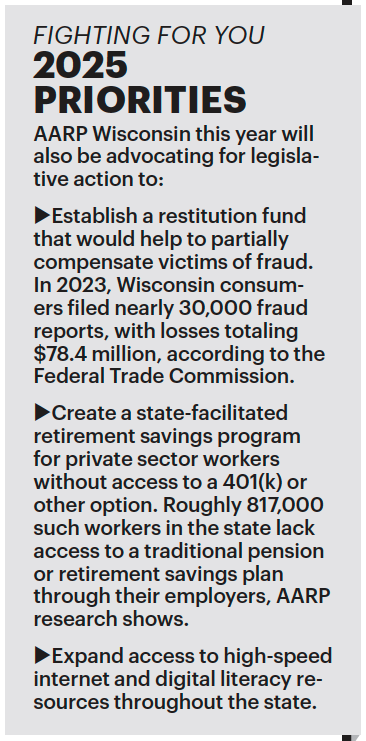AARP Hearing Center

Sixteen years ago, Kirsten McKee’s life took an unexpected turn when her mother, once healthy and active, suffered a brain aneurysm at age 70.
McKee, 56, of Madison, stepped into the role of caregiver not just for her mom but also for her younger brother, who has developmental disabilities. She had to balance those new responsibilities with her job as a physical therapist assistant and raising her own school-age children. Today, she continues to coordinate her brother’s care, while her 86-year-old mom lives with McKee and her husband.
“I don’t think people truly understand the emotional burden, the financial burden,” she says.
Boosting support for the state’s 580,000 family caregivers will be a top advocacy priority for AARP Wisconsin when the 2025 legislative session starts in January. AARP will push lawmakers to pass a state tax credit of up to $500 to help offset expenses—such as adult day care, assistive technology or home modifications—that family caregivers incur.
Oklahoma and Nebraska have passed family caregiver tax credits in recent years, and other states are considering them. Meanwhile, AARP’s national office is also pushing for a maximum $5,000 family caregiver tax credit at the federal level.
“It’s really important that we figure out a way to support those who are going out of their way to take care of their loved ones,” says David Bowen, AARP Wisconsin’s advocacy director.
AARP will also urge the governor and state lawmakers in 2025 to prioritize the needs of caregivers and older Wisconsinites as they develop the state’s 2025-2027 biennial budget.
Relief for workers
Another way to help ease the burden on Wisconsinites providing care to loved ones is to expand the state’s family and medical leave law to allow workers to take up to 14 weeks of paid leave.

Wisconsin law mandates up to two weeks of unpaid leave for eligible employees who are seriously ill themselves or need to care for a seriously ill parent, child or spouse, and up to six weeks of unpaid leave for the birth or adoption of a child. Under federal law, workers can take 12 weeks of unpaid leave in certain situations, including caring for a newborn, caring for a parent or dealing with serious illness.
But state Rep. Francesca Hong (D-Madison) says many workers can’t afford to take unpaid leave.
“No worker should have to choose between their job and taking care of a loved one or themselves,” Hong says.
In 2024, Hong sponsored a bill—supported by AARP—that would have expanded Wisconsin’s family and medical leave law to cover those caring for a domestic partner, sibling, grandparent or other relative. The bill also proposed creating a state-administered program, to which employees and employers would both contribute, enabling workers to receive a portion of their weekly earnings while on leave.
The bill did not receive a vote, but Hong plans to re-introduce it in 2025.
At least 13 states and the District of Columbia have enacted mandatory paid family leave laws, and nine others have voluntary programs, according to the nonprofit Bipartisan Policy Center.
Bryn Ceman, a caregiver support specialist with the Greater Wisconsin Agency on Aging Resources Inc., says both the expansion of paid family leave and a caregiver tax credit would go a long way toward preventing caregiver burnout. The state needs better infrastructure to support future generations of caregivers so that they can care for family members without sacrificing their financial security or quality of life, Ceman says.
“They’re taking on such a tremendous role,” she says.
Health care access
AARP’s Bowen says the organization will also continue to advocate for the expansion of BadgerCare Plus, the state’s Medicaid health program for low-income residents.
Wisconsin is among 10 states that have not expanded Medicaid under the Affordable Care Act to include adults making up to 138 percent of the federal poverty level ($20,783 for a single person in 2024).
An additional nearly 91,000 adults would be eligible for Medicaid in fiscal 2026 if the state expanded, according to Wisconsin Department of Health Services estimates released in September.
“We [would] get a chance to cover a lot more parents, cover a lot more seniors, cover a lot more caregivers who are taking care of a lot of important needs and people in our state,” Bowen says.
Learn more about AARP’s advocacy efforts at aarp.org/wi.
Michelle Crouch is a North Carolina–based journalist who covers health care and consumer issues. She has written for the Bulletin for 10 years.
Also of Interest































































